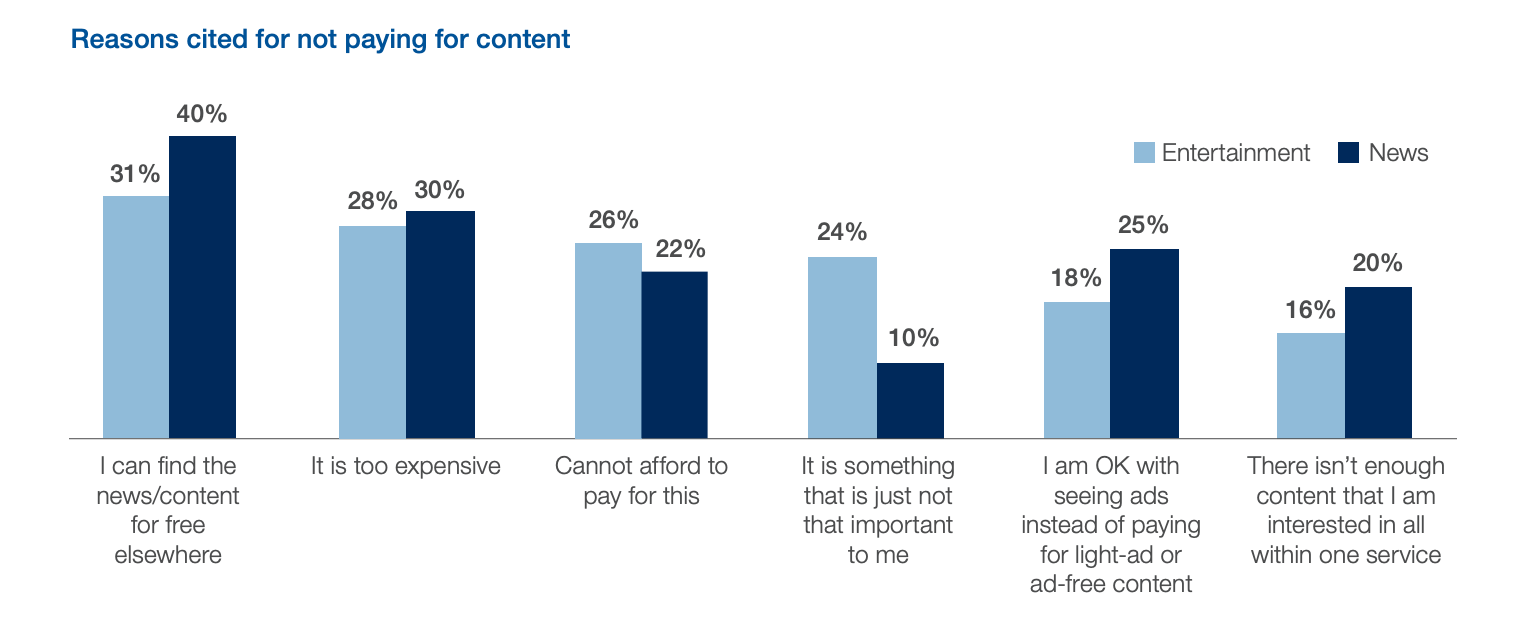The kids are all right, according to a new World Economic Forum report. Young people (ages 16 to 34) are twice as likely to pay for news than those over 55 in Germany, the United Kingdom, and the United States.
The “Understanding Value in Media” report, released today, is based on a survey of more than 9,100 people in China, Germany, India, South Korea, the United Kingdom and the United States. The market research firm Nielsen used online surveys to measure media consumption habits and preferences. (Except in India, where the firm used face-to-face interviews.) The full 40-page report, including country-level insights, is available online.
On average, across all six countries, less than half reported paying for media, with 44 percent paying for entertainment and 16 percent paying for news. This despite a vast majority reporting they read, watch, or listen to news (80 percent) and entertainment (around 90 percent) for almost 24 hours a week. Looking across all countries, the younger generation(s) — remember, people in their early 30s are millennials and the teenagers are Gen Z — were still more likely to pay than their elders, with 17 percent shelling out for news content and 61 percent for entertainment.
In the U.S., the report found fewer consumers pay for news (12 percent) even as a similar number pay for entertainment (44 percent again) than the six-country average.
“Promisingly,” though, the report indicates a future willingness to pay. Almost half — 45 percent — of Americans said they are willing to pay for news and an even higher number (61 percent) for entertainment in the future. “The main question for media companies,” the conclusion reads, “is whether they can convince consumers that they will deliver enough value to make them start paying.” (Indeed.)
In the United States, the ability to find the news for free elsewhere was the top-cited reason for not paying. (In the U.K., home to the BBC and unpaywalled Guardian, that number rose to 47 percent; free news elsewhere was cited as a top reason in Germany (47 percent) and South Korea (54 percent), too.)
The survey reflected that consumers saw their responsibility to pay for news as equal to the government’s responsibility to pay — or fund access to — the news. Given differing cultural norms and legal environments for free speech and press freedom, we’d be interested to see the country-level results for, say, United States and China.
Our survey gives the perception that advertisers, consumers and government each have a similar‑sized role to play. Respondents are aware that advertising can subsidize content creation, as a result of the use or sale of personal data by media companies. In China, awareness is as high as 61%, above the global average of 55%. Yet, on average, almost half of consumers skip advertising whenever possible and almost three in four make efforts to reduce their exposure to it. This suggests that the value exchange between consumers, media and brands needs rethinking and is consistent with executive thinking on this topic. The 60+ leaders we polled from the news, entertainment and advertising industries overwhelmingly agree that media companies need to do more to help consumers understand the value of their data, either by disclosing its value or by adopting regulatory measures.
Consumers do acknowledge their own role in content consumption, with 35% agreeing that they should be responsible for paying for — or funding access to — news, rising to 44% for entertainment. Our data also shows that consumers expect governments to take a bigger role in funding news than entertainment (35% versus 18% respectively), which implies that consumers have a reasonable understanding of the important role that news providers play in promoting healthy political discourse.
Interestingly, 26 percent of respondents said tech platforms should be responsible for funding news, “perhaps giving an indication of where recent narratives about the role of these companies in society may be headed,” the report noted.
Conducted between late October and early November 2019, the survey was completed before the streaming service Disney+ was released in the United States. It was also before the coronavirus pandemic, which the World Economic Forum is calling “the disruption of the century.”
We’re already seeing the effects of disappearing ad revenue on news organizations big and small, digital and legacy, nonprofit and mainly advertising-supported. But the report, which found a greater proportion of paid news subscriptions among higher income or higher-status individuals despite “no consistent pattern” for entertainment services, foreshadows a different aspect to the crisis. The coronavirus outbreak and resulting economic damage may exacerbate an existing information gap between socioeconomic classes, especially as the media industry is forced to rely on more reader-generated revenue.“Concerns of emerging ‘information inequalities,'” the report concludes, “where wealthier consumers have access to more or higher quality information, are very real.”